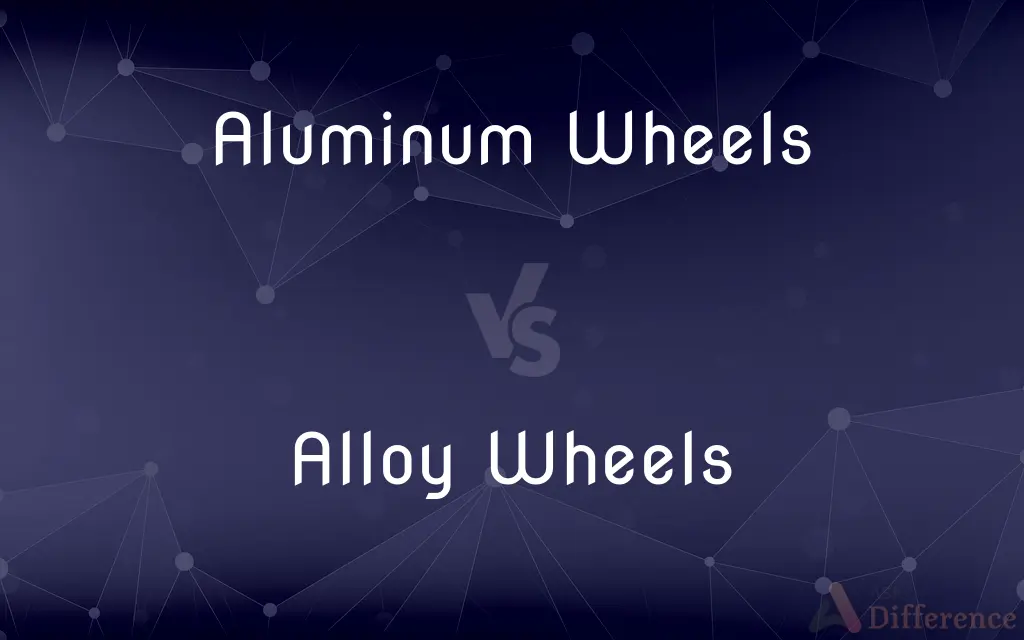Aluminum Wheels vs. Alloy Wheels — What's the Difference?
Edited by Tayyaba Rehman — By Fiza Rafique — Published on September 11, 2024
Aluminum wheels are made purely from aluminum, offering lightweight benefits, while alloy wheels are a blend of aluminum and other metals, enhancing strength and durability.

Difference Between Aluminum Wheels and Alloy Wheels
Table of Contents
ADVERTISEMENT
Key Differences
Aluminum wheels are prized for their lightweight properties, which can improve a vehicle's fuel efficiency and handling. They are made entirely from aluminum, a soft, ductile metal. Alloy wheels, on the other hand, are made from an amalgamation of aluminum and other metals like magnesium, making them stronger and more durable. This combination allows for more intricate designs and improved performance characteristics.
Aluminum wheels are lightweight, while their pure aluminum composition makes them more susceptible to damage like dents and scratches. Alloy wheels, with their blend of metals, offer better resistance to impact and wear, making them a more practical choice for daily use and challenging driving conditions.
In terms of aesthetics, aluminum wheels provide a classic, shiny appearance that appeals to many. However, alloy wheels offer greater versatility in design and finish, including options for matte, gloss, and even textured finishes, catering to a wider range of personal preferences.
Alloy wheels tend to be more expensive than aluminum wheels due to their complex manufacturing process and the benefits they offer, including enhanced durability and a wider variety of design options. This makes alloy wheels a preferred choice for those looking for performance and style.
Despite the popularity of alloy wheels, aluminum wheels still hold a place in the market, especially among enthusiasts who prioritize weight reduction and the classic appearance of pure aluminum. Choosing between the two often comes down to personal preference, intended use, and budget considerations.
ADVERTISEMENT
Comparison Chart
Composition
Made of pure aluminum
Aluminum mixed with other metals (e.g., magnesium)
Weight
Lighter due to pure aluminum
Slightly heavier due to added metals but still lighter than steel
Design Flexibility
Limited by aluminum's properties
Greater flexibility due to material mix
Cost
Generally more affordable
More expensive due to complex manufacturing process
Durability
Less durable, more prone to dents and scratches.
More durable, better resistance to impact and wear.
Design
Limited to simpler designs due to the material's properties.
Allows for more intricate designs and finishes due to material versatility.
Compare with Definitions
Aluminum Wheels
Lightweight wheels made entirely from aluminum, enhancing vehicle performance.
The sports car was equipped with aluminum wheels to reduce its overall weight.
Alloy Wheels
Generally more expensive due to their enhanced properties.
The alloy wheels were a pricier option, but their durability made them worth the cost.
Aluminum Wheels
Can improve handling and acceleration due to their reduced weight.
Aluminum wheels contributed to the car's agile handling on the track.
Alloy Wheels
Can offer performance benefits similar to aluminum wheels but with added strength.
Despite their slightly heavier weight, the alloy wheels did not compromise the car's performance.
Aluminum Wheels
Often chosen for performance-focused vehicles.
Racing teams frequently select aluminum wheels for their lightweight advantage.
Alloy Wheels
Provide a wide range of design and finish options.
He chose matte black alloy wheels to match his car's aesthetic.
Aluminum Wheels
Known for their shiny appearance, offering a classic look.
He preferred aluminum wheels for their bright, reflective finish.
Alloy Wheels
Wheels made from a blend of aluminum and other metals, offering durability.
Her SUV's alloy wheels could withstand rough roads without damage.
Aluminum Wheels
More susceptible to physical damage like dents.
The aluminum wheels were easily dented when he accidentally hit a pothole.
Alloy Wheels
Better suited for everyday use and varied driving conditions.
For his daily commute, he preferred the reliability of alloy wheels.
Common Curiosities
How are alloy wheels different from aluminum wheels in terms of composition?
Alloy wheels are made from a mixture of aluminum and other metals, such as magnesium.
Which type of wheel is more durable?
Alloy wheels are more durable than aluminum wheels.
What are aluminum wheels made of?
Aluminum wheels are made purely from aluminum.
Do alloy wheels improve vehicle performance?
Yes, despite being slightly heavier, they can offer performance benefits without compromising durability.
Are aluminum wheels lighter than alloy wheels?
Yes, aluminum wheels are lighter than alloy wheels.
Can alloy wheels offer more design options than aluminum wheels?
Yes, alloy wheels offer more design and finish options.
Are aluminum wheels suitable for performance vehicles?
Yes, they are often chosen for their lightweight advantage in performance vehicles.
Are aluminum wheels easy to repair?
They can be more prone to damage and may not be as easy to repair as alloy wheels.
Can alloy wheels withstand rough driving conditions better than aluminum wheels?
Yes, their enhanced durability makes them better suited for challenging driving conditions.
Can the finish of the wheels affect vehicle aesthetics?
Yes, the finish (e.g., matte, gloss) can significantly impact the overall look of the vehicle.
Why are alloy wheels generally more expensive?
Due to their enhanced properties and complex manufacturing process.
Are there performance differences between aluminum and alloy wheels on the track?
The differences are minimal, but aluminum wheels might offer a slight advantage in terms of weight.
Can both aluminum and alloy wheels improve fuel efficiency?
Yes, both can improve fuel efficiency, but aluminum wheels have a slight edge due to their lighter weight.
Do alloy wheels require special maintenance?
While they are durable, proper maintenance is recommended to keep them in good condition.
Is the choice between aluminum and alloy wheels a matter of personal preference?
Often, yes, depending on the user's priorities in terms of aesthetics, performance, and budget.
Share Your Discovery

Previous Comparison
Apache vs. Lighttpd
Next Comparison
Far Infrared vs. Near InfraredAuthor Spotlight
Written by
Fiza RafiqueFiza Rafique is a skilled content writer at AskDifference.com, where she meticulously refines and enhances written pieces. Drawing from her vast editorial expertise, Fiza ensures clarity, accuracy, and precision in every article. Passionate about language, she continually seeks to elevate the quality of content for readers worldwide.
Edited by
Tayyaba RehmanTayyaba Rehman is a distinguished writer, currently serving as a primary contributor to askdifference.com. As a researcher in semantics and etymology, Tayyaba's passion for the complexity of languages and their distinctions has found a perfect home on the platform. Tayyaba delves into the intricacies of language, distinguishing between commonly confused words and phrases, thereby providing clarity for readers worldwide.













































